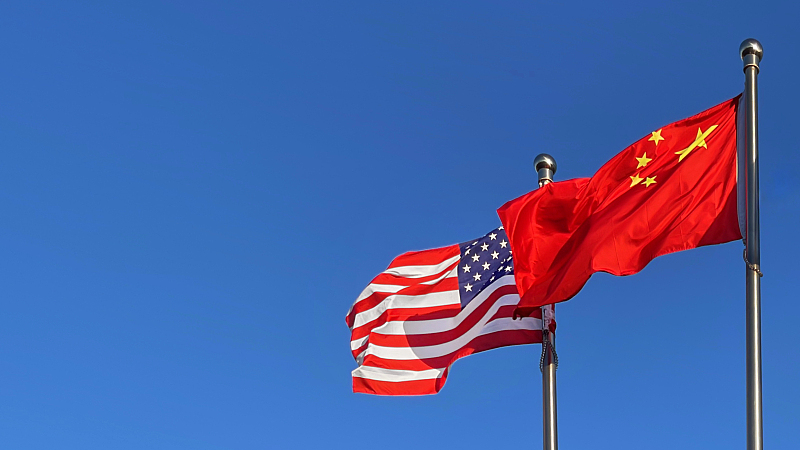Zhao Minghao, a special commentator on current affairs for CGTN, is a professor at the Institute of International Studies under Fudan University and a China Forum expert.

Recently, the Pentagon spokesperson Brigadier General Patrick Ryder admitted that the Chinese "spy balloon,” shot down by U.S. fighter jets over the Atlantic in February, gathered no intelligence during its journey over America. This was quite a buzzkill for the hawks in the U.S. who were rubbing their hands with glee, ready to wave the investigation findings as a smoking gun of China's nefarious intentions.
It turns out the whole thing was a political farce. From the outset, China had made it clear that it was not a "spy balloon,” but rather an unmanned civilian airship used for meteorological research. The poor thing was blown off-course due to westerly winds and its limited control capabilities, and drifted, quite innocently, into American airspace.
However, the U.S. chose to ignore China's explanation and shot the balloon down. Later, U.S. defense and intelligence agencies made joint efforts to inspect the equipment onboard. Now that the truth is out, even their attempt to save face with a "no spying occurred during the flight" seems laughable at best. The hawks and the Biden administration can't escape the fact that they've ended up with egg on their faces.
The deliberate manipulation of the so-called "China threat" by the U.S. and its hysteria towards China have been unmistakably exposed in this farcical episode. Anti-China congressmen like Marco Rubio and Mike Gallagher were quick to hop on their soapboxes, accusing China of espionage and violating U.S. sovereignty. They tried to portray the U.S. as a victim of other countries' reconnaissance activities.
These Republican representatives saw this as a chance to kill two birds with one stone, stoking up the "China threat" narrative on one hand and labelling Biden administration as being soft on China on the other. As expected, under domestic political pressure, the Biden administration made a series of overreactions to show a tough stance on China, including Secretary of State Antony Blinken's postponement of his scheduled visit to China in February.
The first half of this year should have been a crucial time window for implementing the consensus reached by the heads of state of China and the U.S. in Bali, and for stabilizing relations between the two countries. However, due to the mishandling of the "spy balloon" incident, China-U.S. relations have been negatively impacted, causing severe damage to the strategic trust between the two countries.
At the root of the matter, America's flawed perception of China and the intense partisan infighting within the U.S. are the fundamental reasons for the major difficulties in China-U.S. relations and are key obstacles to effective diplomacy between the two sides. As long as America's "China phobia" is not gone, farcical episodes like the "spy balloon" are likely to recur.
It should be noted that the "spy balloon" farce has further damaged the American public's perception of China. The hawks are trying to manipulate this event to normalize the "China threat", thus indoctrinating and mobilizing the U.S. public around the issue of strategic competition between the two countries. Sadly, a vicious cycle has already been formed. On one hand, the fake news operation by U.S. politicians has only strengthened the public's distaste for China.
On the other hand, this manipulated public sentiment serves as fuel for the hawkish politicians to keep the pressure on China. Playing the "China card" has become a popular tactic to gain political mileage and win votes, with both the Republicans and Democrats trying to outdo each other in showing who can be tougher on China. And so, the China policy finds itself an unwilling pawn in this homegrown political showdown.
A study by the U.S.-China Business Council has revealed that the number of bills concerning China in the U.S. Congress has seen a rather impressive uptick since 2017. The 118th Congress, which took office in January, set up a "Select Committee on the Strategic Competition Between the United States and the Chinese Communist Party" in the House of Representatives, trying to stoke the fire and drum up pressure on the Taiwan question, export control, tech cold war, and military containment.
Not long ago, during Blinken's visit to China, the Chinese side proposed building a stable, predictable and constructive China-U.S. relationship, calling on the U.S. to handle unexpected incidents "calmly, professionally and rationally." There is no doubt that the "spy balloon" farce exemplifies the opposite: the U.S. was anything but calm, professional or rational. Despite attempts by the Biden administration to turn the page on this incident, it's evident that profound soul-searching is needed.
The U.S. must correct its misconceptions about China, reduce the negative impact of domestic political struggles on China-U.S. relations, and work constructively with China to create favorable conditions for stabilizing bilateral relations.
(This article was first published on CGTN on Jul 4, 2023.)
